Sharing plates / Portugal
For the love of cod
Forget those health-food fads and staying abstemious. Instead cook up a storm with some comfort food, Iberian style.
Salt cod fritters
(Makes 24)
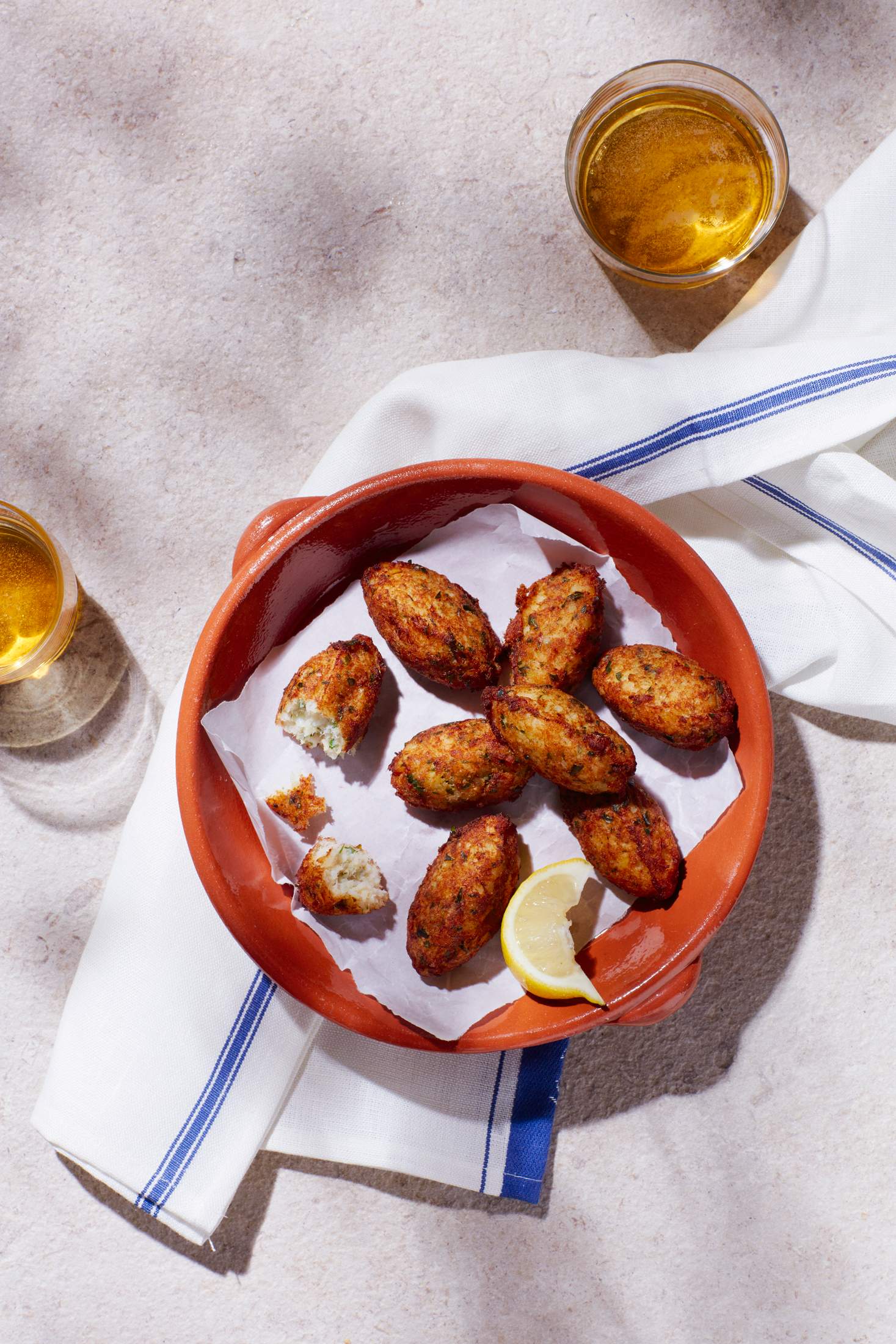
475ml whole milk
1 bay leaf
450g salted cod
2 tsps olive oil
1 onion, finely chopped
4 garlic cloves, minced
300g floury potatoes, such as Maris Piper
2 tbsps parsley, finely chopped
2 tbsps coriander, finely chopped
1 medium egg
Crushed black pepper, to taste
750ml sunflower oil, for deep-frying
Lemon wedges to serve
1. Soak cod in water for 24 hours; change water three or four times.
2. Preheat fan oven to 200c. Place potatoes on a baking tray, prick with a fork and roast for 45-60 minutes. Remove from oven and when cool enough to handle, peel and mash. Set aside.
3. While potatoes are baking, prepare the cod: drain, rinse and put in a large pot. Add milk, bay leaf and enough water to cover the fish. Simmer gently over medium-low heat for 15 minutes until cod is cooked (it should flake when touched). Drain water, remove skin and bones and break flesh into small flakes.
4. Place oil and garlic in a frying pan over a medium heat. When garlic starts to release aroma, add onion and cook until it becomes slightly transparent. Mix with cod in food processor to a smooth paste.
5. Add mashed potato, beaten egg and herbs to the cod paste. Mix well and season with pepper to taste. Chill in fridge for 2 hours.
6. Heat oil to 180c in a deep pan over medium-high heat. Using 2 dessert spoons, shape cod mixture into small lemon shapes and drop into heated oil. Cook until golden brown all over then scoop out with slotted spoon and place on kitchen roll. Repeat until mixture is used up. Serve hot with lemon wedges.
Green bean tempura
(Serves 4)
300g green beans
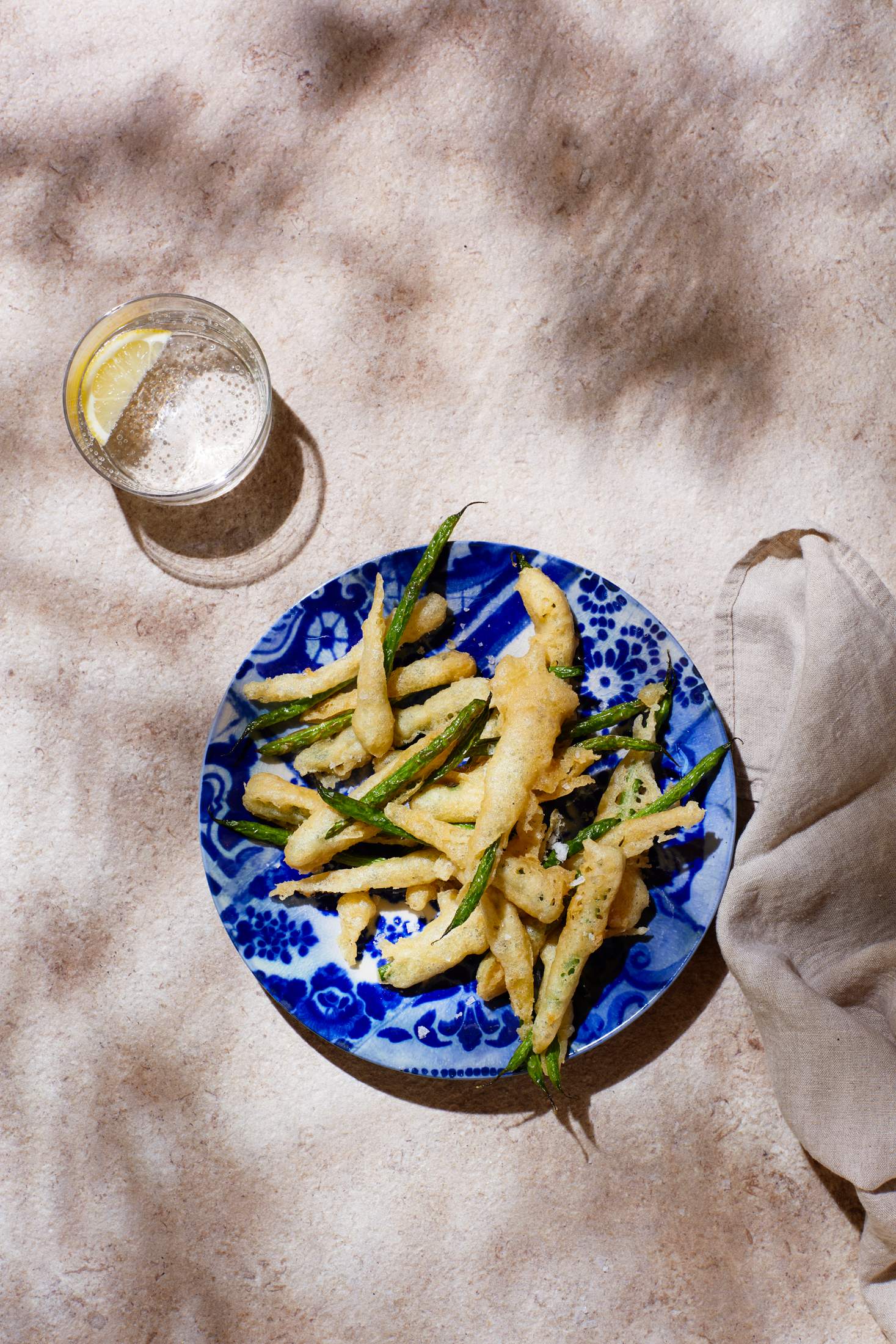
Batter
2 medium eggs (kept in fridge until use)
300ml ice-cold sparkling water
220g self-raising flour (kept in fridge until use), plus extra to dust beans
750ml sunflower oil, for deep-frying
1. Trim ends off beans. Boil water with a pinch of salt in a pan over high heat. Cook beans for 1 minute, drain and cool in ice-cold tap water. Drain and pat beans dry.
2. Start to heat oil in deep pan over medium-high heat.
3. Place the eggs, sparkling water and a pinch of salt into a large bowl. Sieve in self-rising flour and mix lightly with a whisk; the consistency should be like single cream. (Too much whisking will result in a batter that is too heavy.)
4. When oil reaches 190c, dust beans with flour. Dip into batter and fry for 2 minutes, or until batter becomes crispy and golden brown.
5. Serve with sea salt and lemon wedges.
Fava beans with chouriço
(Serves 6 as tapas)
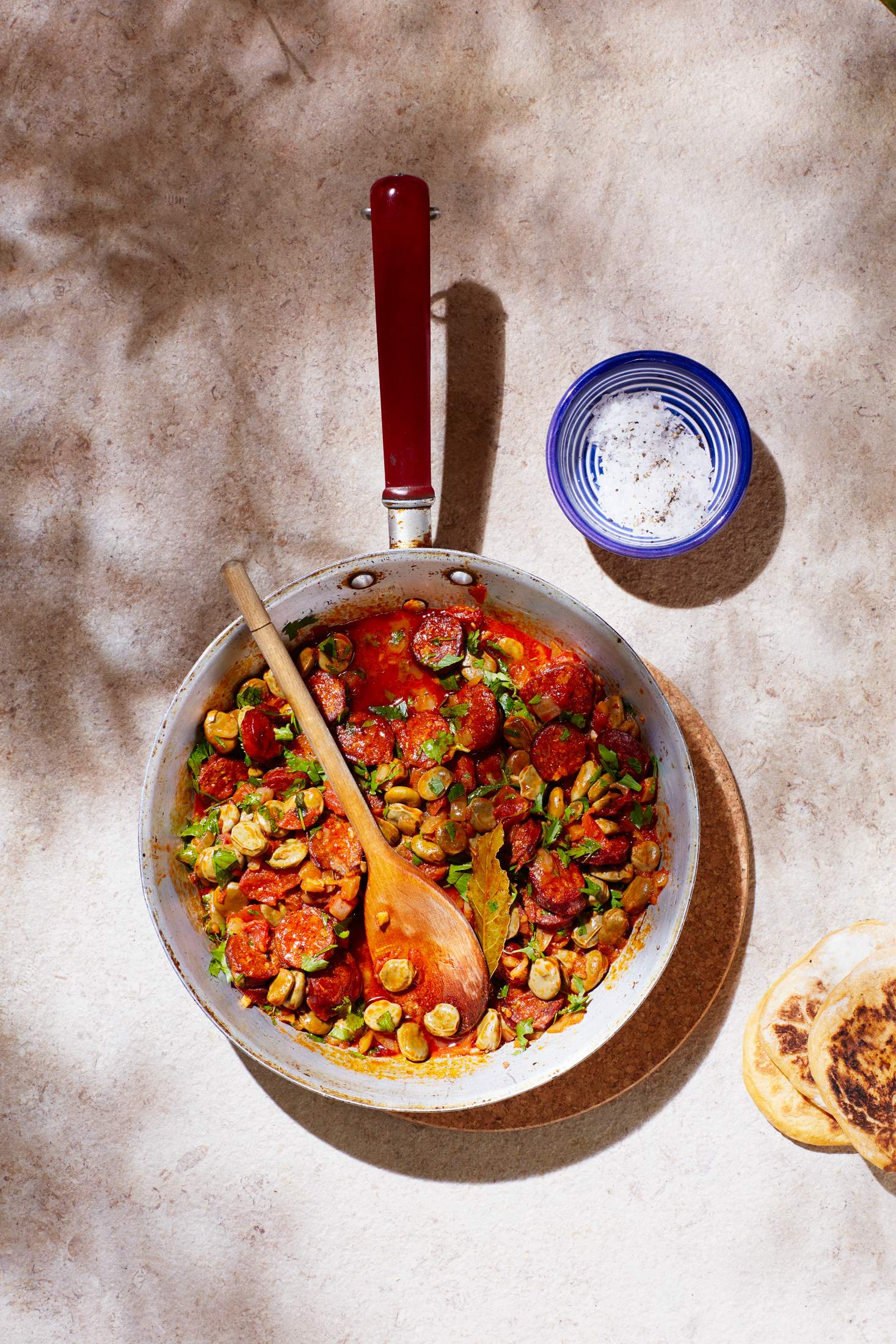
1 tbsp olive oil
1 large onion, chopped
2 garlic cloves, finely chopped
250g chouriço sausage, cut into 5mm slices
250g fresh broad (fava) beans
1 bay leaf
2 tsps Portuguese sweet red-pepper paste (massa de pimentão), optional
1 tsp Portuguese paprika or sweet paprika powder
2 ripe tomatoes, roughly chopped
200ml vegetable stock
60ml white wine
2 tsps coriander, finely chopped
Crushed black pepper
2 tsps parsley, finely chopped, to garnish
1. Heat 1 tbsp olive oil in frying pan over a medium heat. Cook chouriço on both sides until crispy and remove from pan. Cook onion for about 5 minutes, add the garlic and cook for a further 5 minutes.
2. Add all other ingredients, except beans, and bring to boil. Simmer for 15 minutes then add beans. Cover with lid and cook on low heat for 20 minutes, or until the beans soften.
3. Season with black pepper and massa de pimentão. Sprinkle with parsley and serve with crusty bread.
Madeira bread with garlic butter
(Makes 15)
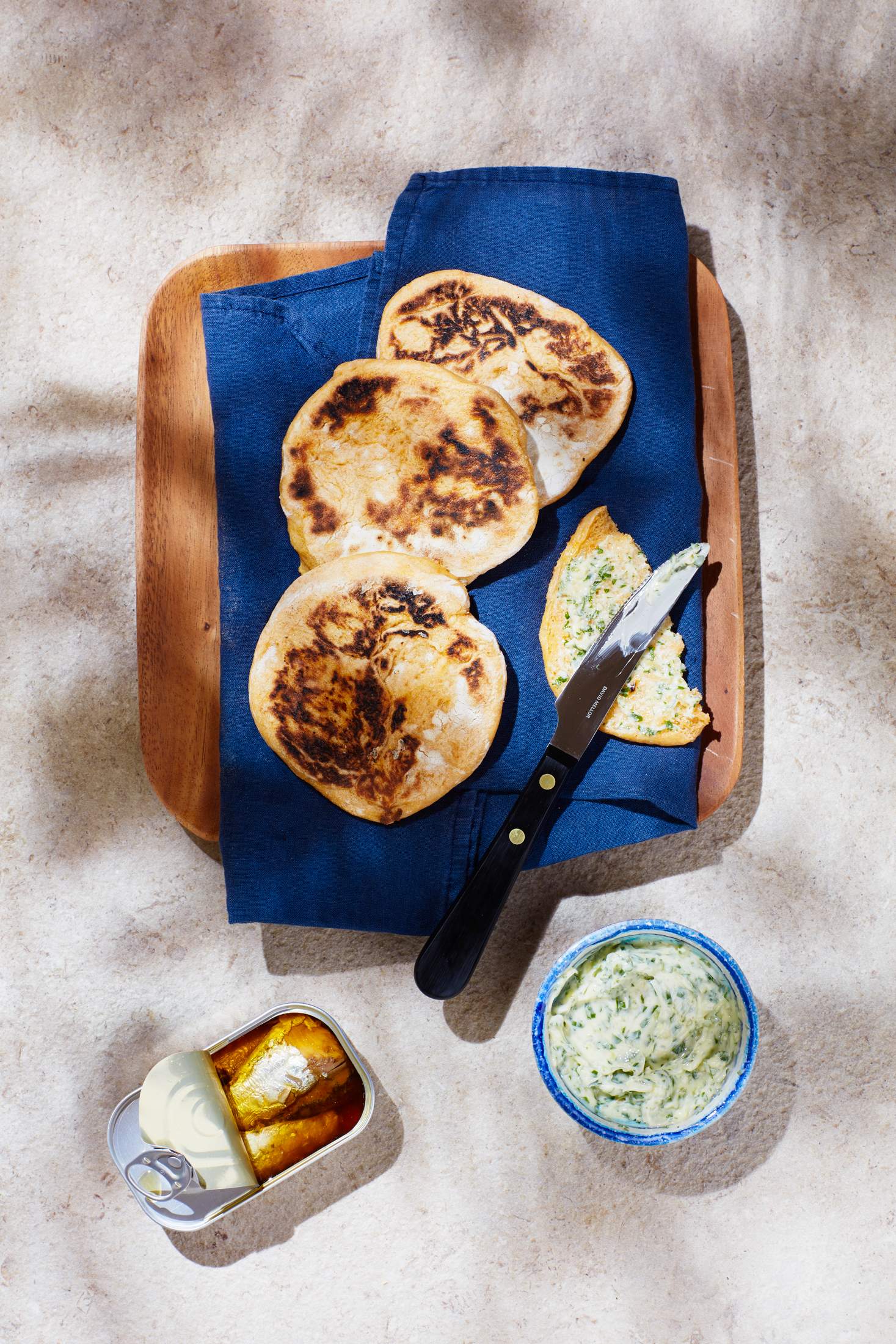
Bread
1-2 sweet potatoes (to make about 225g of purée)
1 sachet (7g) fast-acting yeast
450g plain flour
1 tsp sea salt
120-180ml lukewarm water
Sunflower oil, for greasing
Garlic butter
150g unsalted butter, softened
3 medium garlic cloves, peeled and finely chopped
2 tbsps parsley, finely chopped
½ tsp sea salt
1. Preheat fan oven to 200c. Place sweet potatoes on a baking tray, prick with a fork and roast for 45-60 minutes. Remove from oven and when cool enough to handle, cut potatoes in half, scrape out flesh and discard skin. Mash into smooth puree. Place flour, salt and yeast in a large bowl. Add purée, mix with a wooden spoon to incorporate ingredients, then add lukewarm water little by little (the consistency should be neither too dry nor too wet but, rather, soft and smooth; you don’t need to add all the water). Once the dough is coming together, knead for 8 minutes.
2. Place dough in oiled bowl; cover with oiled clingfilm. Leave in a warm spot in your kitchen until it’s doubled in size (about 1 hour).
3. While bread is proving, prepare the garlic butter. Mix all ingredients and set aside.
4. When dough is ready, divide into pieces the size of plums (about 60g each). Roll dough pieces into balls and flatten with a rolling pin to end up with a piece about 10cm across and 1cm thick.
5. Place rolled bread on baking tray that’s been dusted with flour. Cover with a damp towel. Let it prove in a warm spot for 30 minutes.
6. Preheat a cast-iron pan over medium-low heat. Place rolled bread in pan (no need for oil), cook for 5 minutes, then flip over and cook for 5 minutes until golden brown.
6. Remove from the pan, cut in half horizontally, spread with plenty of garlic butter and serve immediately.
Octopus salad
Serves 4
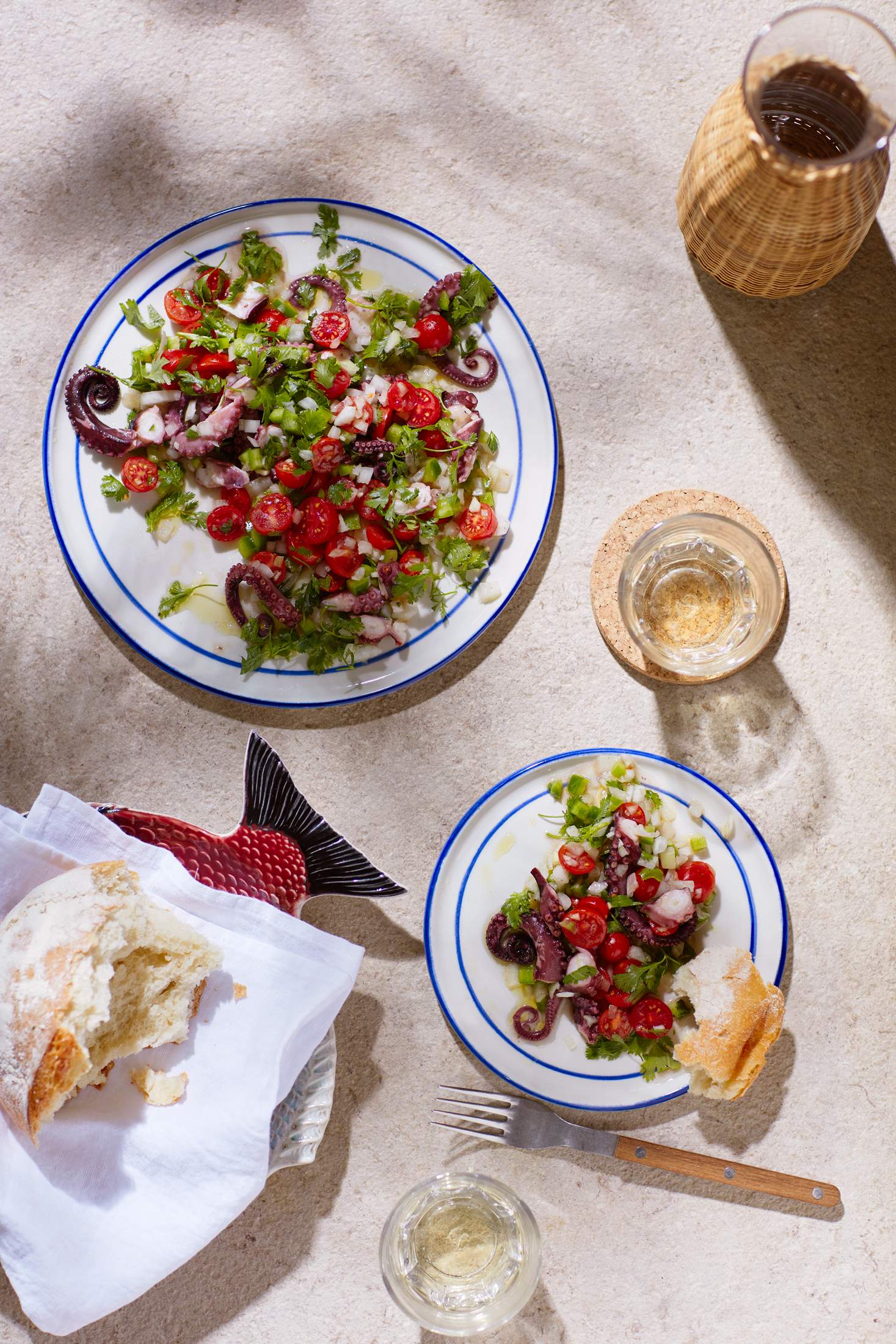
900g frozen octopus, defrosted (or freeze fresh octopus overnight, then defrost)
2 small onions, finely chopped
2 large garlic cloves, finely chopped
60g coriander, finely chopped
300g cherry tomatoes, quartered
1 green pepper, finely diced
Dressing
6 tbsps extra virgin olive oil
4 tbsps white wine vinegar
4 tbsps lemon juice
1/2 tsp sea salt
Black pepper, to taste
1. Place octopus in pan, cover and simmer for 20-30 minutes, or until tender. Drain water and when cool enough to handle, cut tentacles into small pieces.
2. In a bowl combine octopus, onion, garlic, coriander, tomatoes and green pepper.
3. Combine all dressing ingredients and mix into octopus salad. Serve.
Portuguese doughnuts
(Makes 16)
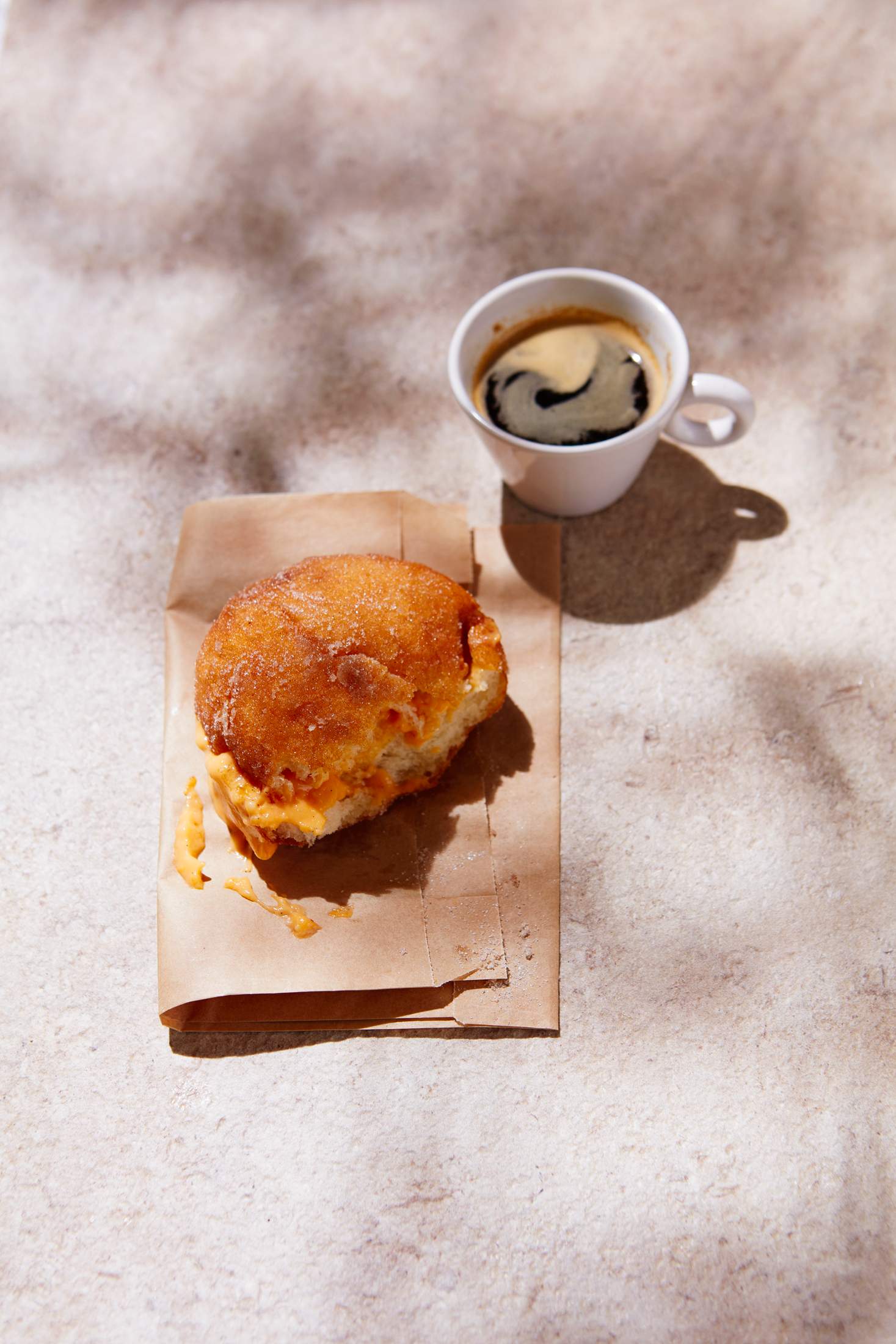
Dough
150ml milk
2 tsps lemon
10ml water
1 medium-sized egg, beaten
40g unsalted butter, melted
450g bread flour
30g sugar
1 tsp salt
1 sachet (7g) fast-acting yeast
Custard
1 sweet potato (200g)
300ml whole milk
1 vanilla pod, deseeded
3 tbsps caster sugar
1 large pinch of sea salt
2 egg yolks (medium-sized eggs)
2 tbsps corn starch
750ml sunflower oil, for deep-frying
125g caster sugar
1 tsp cinnamon powder
Baking parchment
1. Preheat fan oven to 200c. Place sweet potato on a baking tray, prick with a fork and roast for 45-60 minutes. Remove from oven and when cool enough to handle, peel potato, place in a bowl and mash with a masher – or using a blender – to make smooth puree. Leave to cool.
2. To make dough, place lemon juice and milk in a measuring cup and leave to stand for 5 minutes. Milk will appear set and look like yoghurt.
3. Place remaining dry ingredients for dough in a large bowl, making a large well in the middle.
4. Place the milk-and-lemon mixture, water, beaten egg and melted butter in another bowl and mix well. Pour 3/4 of the liquid into the well of dry ingredients and quickly incorporate with wooden spoon. Add 1/3 liquid if necessary, little by little, until you get desired texture (the consistency should be neither too dry nor too wet but rather soft and smooth).
5. Once dough is coming together, knead for 8 minutes until smooth and elastic. Place dough in oiled bowl; cover with oiled clingfilm. Leave in a warm spot in your kitchen until it’s doubled in size (about 1 hour).
6. While waiting for the bread to prove, make custard. Pour milk into a pan, add vanilla pod and seeds and set over low heat. Bring it to just below boiling point.
7. Place caster sugar, salt, egg yolk and cornstarch in a separate bowl and mix well.
8. When milk is ready add one ladleful of it to egg mixture and mix well, then add rest of milk gradually and keep mixing.
9. Rinse milk pan and tip custard mix into it. Place on medium-low heat and keep stirring with a wooden spoon or spatula. Take care not to boil custard – keep stirring until it thickens. The custard will be ready when it becomes thick enough to coat the back of the spoon.
10. Remove pan from heat and pour mixture into a bowl; add mashed sweet potato and mix thoroughly to incorporate. Cover surface of the custard with clingfilm to prevent a skin forming. Set aside to cool.
11. Cut 16 pieces of baking parchment into 10cm 3 10cm squares and lightly oil them. Place onto a baking tray.
12. Once dough is ready, tip out on a floured surface and knead lightly. Divide it into 16 equally sized pieces (about 45g each) and roll each one into a ball. Place on the parchment pieces. Cover the tray with oiled clingfilm. Leave in a warm spot in your kitchen until dough balls roughly double in size (about 1 hour).
13. Heat oil to 180c in a deep, large pan. Drop dough balls into pan using baking paper to carefully slide them into the oil. Flip with a slotted spoon once they turn golden brown. Once cooked on both sides, remove them with slotted spoon to a tray lined with paper towels (do this in batches).
14. When all the doughnuts are cooked, roll them in cinnamon and sugar. Then make an incision across the doughnut but not all the way through. Put the custard into a piping bag and pipe into the cut doughnut. Serve.


